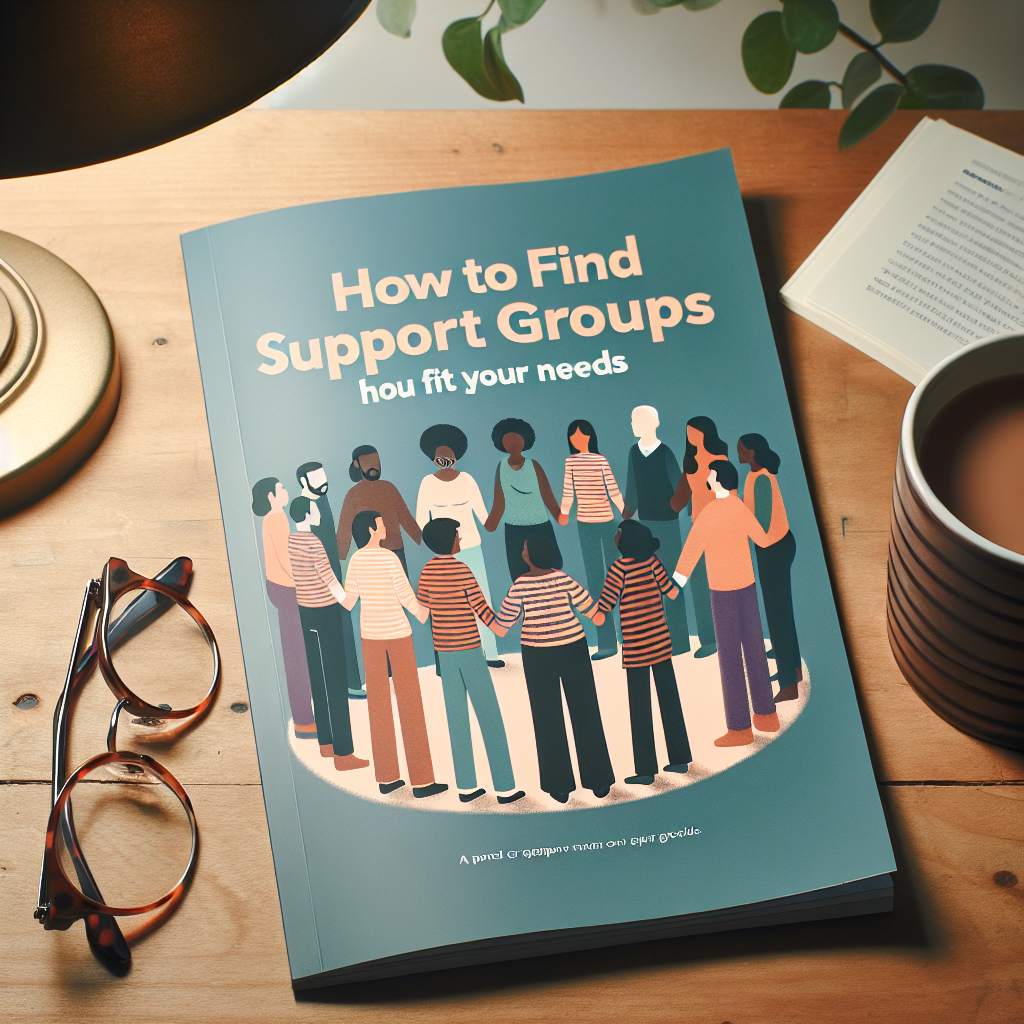-
Table of Contents

“Discover Your Tribe: Find the Perfect Support Group for Your Journey”
Introduction
Finding the right support group can be a crucial step in managing personal challenges and fostering a sense of community. Whether you’re dealing with health issues, emotional struggles, or life transitions, support groups offer a space to share experiences, gain insights, and receive encouragement from others who understand your situation. This guide will help you navigate the process of identifying and joining a support group that aligns with your specific needs, ensuring you receive the most relevant and effective support. From understanding the types of support groups available to evaluating their suitability, this introduction will set the stage for a more detailed exploration of finding the perfect support network for you.
Identifying the Right Support Group for Your Specific Needs
Finding the right support group can be a transformative experience, offering a sense of community, understanding, and shared purpose. The journey to identifying the right support group for your specific needs begins with self-reflection. Understanding your own needs, challenges, and goals is crucial. Are you seeking emotional support, practical advice, or a combination of both? Knowing what you hope to gain from a support group will guide you in the right direction.
Once you have a clear understanding of your needs, the next step is to research available options. The internet is a valuable resource, providing access to a wide range of support groups. Websites like Meetup, Facebook, and specialized forums can connect you with groups that align with your interests and needs. Additionally, healthcare providers, therapists, and community centers often have information about local support groups. Don’t hesitate to ask for recommendations from professionals who understand your situation.
As you explore different groups, consider the format that best suits you. Support groups can be in-person, online, or a hybrid of both. In-person groups offer face-to-face interaction, which can be incredibly powerful for building connections. On the other hand, online groups provide flexibility and accessibility, allowing you to participate from the comfort of your home. Hybrid groups offer the best of both worlds, giving you the option to choose based on your schedule and comfort level.
When evaluating potential support groups, pay attention to the group’s focus and structure. Some groups are led by professionals, such as therapists or counselors, while others are peer-led. Professional-led groups often provide expert guidance and structured activities, which can be beneficial if you’re looking for a more formal approach. Peer-led groups, however, offer a sense of camaraderie and shared experience, which can be incredibly validating and empowering.
It’s also important to consider the group’s size and dynamics. Smaller groups may offer a more intimate setting, allowing for deeper connections and more personalized support. Larger groups, however, can provide a broader range of perspectives and experiences. Think about what environment you feel most comfortable in and what will best support your growth and healing.
Before committing to a group, attend a few sessions to get a feel for the atmosphere and dynamics. Observe how members interact with each other and with new participants. Are they welcoming and inclusive? Do they respect each other’s privacy and boundaries? A supportive and respectful environment is essential for a positive experience.
Trust your instincts when making a decision. If a group doesn’t feel right, it’s okay to keep looking. The right support group will resonate with you and provide a sense of belonging. Remember, finding the perfect fit may take time, but the effort is worth it.
Finally, be open to the possibility of outgrowing a support group. As you progress on your journey, your needs may change. It’s important to reassess periodically and seek out new groups that align with your evolving goals and challenges. Growth is a continuous process, and finding the right support group is an ongoing journey.
In conclusion, identifying the right support group for your specific needs involves self-reflection, research, and a willingness to explore different options. By considering factors such as format, focus, structure, and group dynamics, you can find a supportive community that empowers you on your path to healing and growth. Trust the process, stay open to new possibilities, and remember that the right support group can make all the difference.
Steps to Evaluate and Join the Perfect Support Group for You
Finding the right support group can be a transformative experience, offering a sense of community, understanding, and shared purpose. The journey to discovering a group that fits your needs involves several thoughtful steps, each designed to ensure that you find a supportive environment where you can thrive. To begin with, it is essential to identify your specific needs and goals. Reflect on what you hope to gain from joining a support group. Are you seeking emotional support, practical advice, or a combination of both? Understanding your objectives will help you narrow down your options and focus on groups that align with your aspirations.
Once you have a clear idea of your needs, the next step is to research available support groups. This can be done through various channels, such as online searches, community centers, healthcare providers, and social media platforms. Look for groups that cater to your specific situation, whether it be related to health conditions, life transitions, or personal challenges. As you gather information, pay attention to the group’s mission, values, and the type of support they offer. This will give you a sense of whether the group’s approach resonates with you.
After identifying potential groups, it is crucial to evaluate their credibility and effectiveness. Seek out reviews or testimonials from current or past members to gain insight into their experiences. Additionally, consider reaching out to the group’s facilitator or leader to ask questions about the group’s structure, meeting frequency, and the qualifications of those leading the sessions. This step is vital in ensuring that the group is well-organized and led by individuals who are equipped to provide meaningful support.
Transitioning from research to participation, the next step is to attend a few meetings as a guest or observer. Many support groups offer the option to attend initial sessions without committing to membership. This allows you to get a feel for the group dynamics, the level of interaction, and the overall atmosphere. Pay attention to how comfortable you feel sharing your thoughts and whether the group members are respectful and supportive of one another. This firsthand experience is invaluable in determining if the group is a good fit for you.
As you continue to evaluate the group, consider the logistics of participation. Reflect on whether the meeting times and locations are convenient for you. If the group meets in person, ensure that the venue is accessible and comfortable. For online groups, check the platform’s ease of use and the quality of virtual interactions. Consistent attendance is key to reaping the benefits of a support group, so it is important to choose one that fits seamlessly into your schedule.
Finally, trust your instincts and make a decision based on your overall impressions and experiences. If you find a group that feels right, take the step to become an active member. Engage fully in the sessions, share your experiences, and offer support to others. Remember that the value of a support group lies in the mutual exchange of empathy and encouragement. If, however, you find that a group does not meet your needs, do not be discouraged. The process of finding the perfect support group may take time, but the effort is well worth it.
In conclusion, finding a support group that fits your needs involves a series of thoughtful steps, from identifying your goals to evaluating potential groups and participating in meetings. By taking the time to research, observe, and reflect, you can find a supportive community that offers the understanding and encouragement you seek. Embrace the journey with an open heart, and you will discover a space where you can grow, heal, and connect with others who share your path.
Q&A
1. **Question:** How can I find local support groups that match my specific needs?
**Answer:** You can find local support groups by checking community centers, hospitals, or mental health clinics, and by searching online directories such as Meetup, Psychology Today, or the National Alliance on Mental Illness (NAMI) website.
2. **Question:** What should I consider when choosing a support group?
**Answer:** Consider the group’s focus, size, meeting format (in-person or online), the facilitator’s qualifications, the group’s rules and confidentiality policies, and whether the group’s schedule fits your availability.
Conclusion
To find support groups that fit your needs, start by identifying your specific requirements and goals. Research various options through online directories, healthcare providers, and community centers. Evaluate the group’s focus, size, meeting format, and facilitator qualifications. Attend a few sessions to assess the group’s dynamics and ensure it aligns with your expectations. Seek recommendations from trusted sources and be open to trying different groups until you find the right fit.



